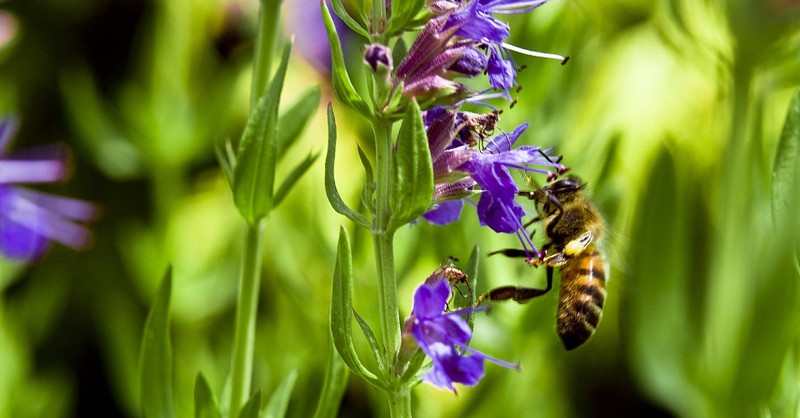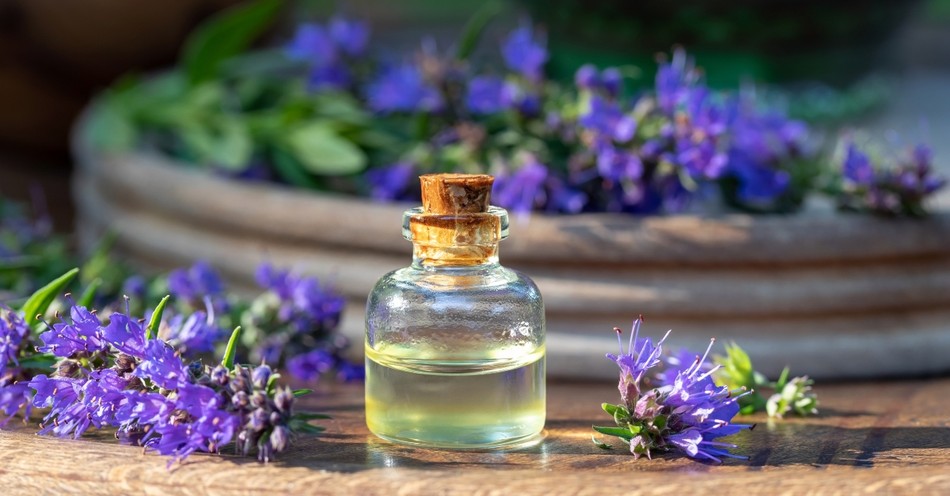The hyssop plant, or Hyssopus officinalis, is a shrub in the mint family native to Southern Europe, the Middle East, and the area encircling the Caspian Sea. Due to its purported results as an antiseptic, cough reliever, and expectorant, it has been used in traditional herbal treatments.
According to WebMD, "The parts that grow above the ground are used to make medicine. Hyssop is used for digestive and intestinal problems, infection of the airways, poor circulation, skin problems, and other conditions, but there is no good scientific evidence to support these uses."
The word hyssop occurs as a translation of ezov in some translations of the Bible, notably in Psalms 51:7: "Purge me with hyssop, and I shall be clean", but researchers have proposed that the Biblical references direct not to the plant now known as hyssop but instead to one of a mixture of various herbs, including Origanum syriacum (Syrian oregano, commonly referred to as "Bible hyssop").
Photo credit: ©Getty Images/Madeleine_Steinbach

Psalm 51: Purge Me With Hyssop, and I Shall Be Clean
Have mercy on me, O God, according to your steadfast love; according to your abundant mercy blot out my transgressions. Wash me thoroughly from my iniquity, and cleanse me from my sin! For I know my transgressions, and my sin is ever before me. Against you, you only, have I sinned and done what is evil in your sight, so that you may be justified in your words and blameless in your judgment. Behold, I was brought forth in iniquity, and in sin did my mother conceive me. Behold, you delight in truth in the inward being, and you teach me wisdom in the secret heart. Purge me with hyssop, and I shall be clean; wash me, and I shall be whiter than snow. Let me hear joy and gladness; let the bones that you have broken rejoice. Hide your face from my sins, and blot out all my iniquities. Create in me a clean heart, O God, and renew a right spirit within me. ~ Psalm 51:1-10

Hyssop in the Bible
In the Bible, hyssop is a plant used for ritual cleansing purposes; a humble plant springing out of the wall (1 Kings 4:33), the extreme contrast to the cedar.
The common hyssop (Hyssopus officinalis) of the Natural Order Labiatae, an aromatic plant with stomatic properties, cannot be the hyssop of the Bible as it is unknown in Palestine, but allied aromatic plants of the same Natural Order have by Maimonides (Neg. xiv.6) and other Jewish writers been identified with it. Probably hyssop is identical with the Arabic zat`ar, a name applied to a group of aromatic plants of the genus marjoram and thyme. They would any of them furnish a bunch suitable for sprinkling, and they have the important recommendation that they grow everywhere, being found even in the desert. Post thinks of all varieties the Origanum maru, a special variety of marjoram which favors terrace walls and rocks, is the most probable. (Source: ISBE)
10 Bible Verses with "Hyssop"
Psalm 51:7
Purge me with hyssop, and I shall be clean; wash me, and I shall be whiter than snow.
Exodus 12:22
Take a bunch of hyssop and dip it in the blood that is in the basin, and touch the lintel and the two doorposts with the blood that is in the basin. None of you shall go out of the door of his house until the morning.
John 19:29-30
A jar full of sour wine stood there, so they put a sponge full of the sour wine on a hyssop branch and held it to his mouth. When Jesus had received the sour wine, he said, “It is finished,” and he bowed his head and gave up his spirit.
Leviticus 14:52
Thus he shall cleanse the house with the blood of the bird and with the fresh water and with the live bird and with the cedarwood and hyssop and scarlet yarn.
1 Kings 4:33
He spoke of trees, from the cedar that is in Lebanon to the hyssop that grows out of the wall. He spoke also of beasts, and of birds, and of reptiles, and of fish.
Leviticus 14:4
The priest shall command them to take for him who is to be cleansed two live clean birds and cedarwood and scarlet yarn and hyssop.
John 19:29
A jar full of sour wine stood there, so they put a sponge full of the sour wine on a hyssop branch and held it to his mouth.
Numbers 19:6
And the priest shall take cedarwood and hyssop and scarlet yarn, and throw them into the fire burning the heifer.
Leviticus 14:51
And shall take the cedarwood and the hyssop and the scarlet yarn, along with the live bird, and dip them in the blood of the bird that was killed and in the fresh water and sprinkle the house seven times.
John 19:28-30
After this, Jesus, knowing that all was now finished, said (to fulfill the Scripture), “I thirst.” A jar full of sour wine stood there, so they put a sponge full of the sour wine on a hyssop branch and held it to his mouth. When Jesus had received the sour wine, he said, “It is finished,” and he bowed his head and gave up his spirit.

Historical Uses of Hyssop
The use of the hyssop plant, though the name has referred to different specific plants over various times and regions, dates back thousands of years.
According to Encyclopedia.com, it was used for cleansing and healing saying:
The Hebrew people called this herb azob, meaning "holy herb." Hyssop was used in ancient times as a cleansing herb for temples and other sacred places. It was also used to repel insects. The Romans used hyssop to bring protection from the plague and prepared an herbal wine containing hyssop. In ancient Greece, the physicians Galen and Hippocrates valued hyssop for inflammations of the throat and chest, pleurisy, and other bronchial complaints. In the early seventeenth and eighteenth centuries, hyssop tea and tincture were used to treat jaundice and dropsy.
Photo credit; Pixabay/lucianaeris





